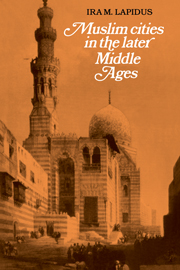Book contents
- Frontmatter
- Contents
- PREFACE
- INTRODUCTION
- CHAPTER I A HISTORY OF CITIES IN THE MAMLUK EMPIRE
- CHAPTER II THE MAMLUK REGIME IN THE LIFE OF THE CITIES
- CHAPTER III THE URBAN SOCIETY
- CHAPTER IV THE POLITICAL SYSTEM: THE MAMLUK STATE AND THE URBAN NOTABLES
- CHAPTER V THE POLITICAL SYSTEM: THE COMMON PEOPLE BETWEEN VIOLENCE AND IMPOTENCE
- CHAPTER VI CONCLUSION: SOCIETY AND POLITY IN MEDIEVAL MUSLIM CITIES
- BIBLIOGRAPHICAL NOTES
- INDEX
- Frontmatter
- Contents
- PREFACE
- INTRODUCTION
- CHAPTER I A HISTORY OF CITIES IN THE MAMLUK EMPIRE
- CHAPTER II THE MAMLUK REGIME IN THE LIFE OF THE CITIES
- CHAPTER III THE URBAN SOCIETY
- CHAPTER IV THE POLITICAL SYSTEM: THE MAMLUK STATE AND THE URBAN NOTABLES
- CHAPTER V THE POLITICAL SYSTEM: THE COMMON PEOPLE BETWEEN VIOLENCE AND IMPOTENCE
- CHAPTER VI CONCLUSION: SOCIETY AND POLITY IN MEDIEVAL MUSLIM CITIES
- BIBLIOGRAPHICAL NOTES
- INDEX
Summary
Self-governing commune, bureaucratically administered city—this dichotomy has long dominated the study of medieval cities. The former term has come to describe European, the latter Asian cities, for communal associations have seemed crucial in accounting for differences in their experience. Our understanding of Asian, and of Muslim cities in particular, has suffered from this point of view. Idealizations of the European commune have so captured the imagination of historians that many have taken it to be the pure form of premodern city organization. The assembly of self-governing citizens or their chosen representatives has seemed to be the true, complete, and ideal fulfillment of city life. Communal associations enabled medieval European cities to overthrow imperial oppressors and other overlords, and to enjoy a vital and intense commercial life. Some of them sustained the crusades and the great adventures of European expansion, and formed within themselves the culture of the Renaissance.
By contrast, many historians have imagined the Muslim world as governed by empires whose great bureaucracies snuffed out the independence of the towns. In Muslim cities the antique heritage of communal independence and voluntary association for public ends had been eliminated. Muslim cities are never regarded as communities but as collections of isolated internal groups unable to cooperate in any endeavor of the whole, with notables capable of common action only on an exceptional and ad hoc basis—as cities governed by fixed administrative arrangements imposed by imperial regimes, and by the ascription, through unchanging tradition, of certain essential tasks to different classes and bodies of the society.
- Type
- Chapter
- Information
- Muslim Cities in the Later Middle Ages , pp. 1 - 8Publisher: Cambridge University PressPrint publication year: 1984



